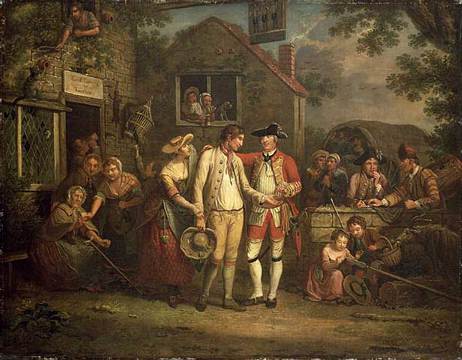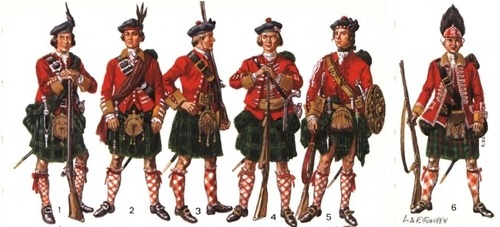The enlistment in the British armies was voluntary, so in the 1700s and up to the mid 1800s, the recruiting sergeants with a drummer boy often went around the britain countryside. They were able at convincing the already a little tipsy youngsters who were in the inns, to take the infamous “King’s Shilling“.
They took advantage of the disadvantaged, the evicted sharecroppers and reduced to work as daily laborers, those who were without a job and who saw in recruitment the alternative not to starve. The most naive succumbed by the charm of adventure or simply they were too drunk to think clearly!

Twa recruitin’ sergeants
“Twa recruitin ‘sergeants” is a song coming from Scottish tradiction and is almost a historical document of life in the bothy farms about some poor young boys and their miserable life. The origin of the song dates back to 1700 and was popular again in the 1960s with Jeannie Robertson’s version.
A.L. Lloyd pointed out that Farquhar’s play, ‘The Recruiting Officer’ (1706) helped popularise ‘Over the Hills and Far Away’. The song was often sung during the Napoleonic Wars. It ‘survived for two and a half centuries among folk singers, dwindling all the time, till it seemed to be limited to the Scottish north-east’. Then a variant came back into ‘vigorous circulation in English cities under the title “Two Recruiting Sergeants from the Black Watch” (da Mudcat qui)
The melody is obviously a merry march, perfect to impress the unfortunate ones..
Gaberlunzie (stanza I, II, III, V)
Schooner Fare (stanza I, II, IV, V)
Adam Raeburn & Friends
A Parcel o’ Rogues (stanza I, II, IV, V)
I Twa recruiting sergeants came frae the Black Watch Tae markets and fairs, some recruits for tae catch. But a’ that they ‘listed was forty and twa: Enlist my bonnie laddie an’ come awa. Chorus: And it’s over the mountain and over the Main, Through Gibralter, to France and Spain. Pit a feather tae your bonnet, and a kilt aboon your knee, Enlist my bonnie laddie and come awa with me. II Oh laddie ye dinna ken the danger that yer in. If yer horses was to fleg, and yer owsen was to rin, This greedy old farmer, he wouldna pay yer fee. Sae list my bonnie laddie and come awa wi’ me III With your tattie porin’s and yer meal and kale, Yer soor sowan’ soorin’s and yer ill-brewed ale, Yer buttermilk, yer whey, and yer breid fired raw. Sae list my bonnie laddie and come awa. IV And its into the barn and out o’ the byre, This ole farmer, he thinks ye never tire. It’s slavery a’ yer life, a life o’ low degree. Sae list my bonnie laddie and come awa with me V O laddie if ye’ve got a sweetheart an’ a bairn, Ye’ll easily get rid o’ that ill-spun yarn. Twa rattles o’ the drum, aye and that’ll pay it a’. Sae list my bonnie laddie and come awa. |
English translation Cattia Salto I Two recruiting sergeants came from the Black Watch To markets and fairs, some recruits for to catch. But all that they enlisted was forty and two: Enlist my handsome boy and come away. Chorus: And it’s over the mountain and over the Main, Through Gibraltar, to France and Spain(1). Pit a feather to your cap (2), and a kilt above your knee, Enlist my handsome boy and come away with me. II Oh boy you don’t knew the danger that you are in. If your horses was to take fright, and your oxen was to run,(3) This greedy old farmer, he would not pay your fee. So list my handsome boy and come away with me III(4) With your boiled potatoes(5) and your oatmeal(6) and cabbage(7), Your jellied oatmeal (8) and your ill-brewed ale, Your buttermilk(9), your whey(10), and your bread fired raw. So list my handsome boy and come away. IV And its into the barn and out of the byre, This old farmer, he thinks you never tire. It’s slavery all your life, a life of low degree. So list my handsome boy and come away with me V O boy if you have got a sweetheart and a child, You’ll easily get rid of that ill-spun yarn(11). Two rattles of the drum(12), yes and that’ll pay it all So list my handsome boy and come away |
NOTE
1) see “Over the hills and far away”
2) the Black Watch uniform: black and green plaid, waistcoat and red jacket, blue cap, musket, bayonet, sword and dagger. In 1795 they adopted the red hackle for their cap.

3) the sergeants turned to the horsemen and seasonal plows of the bothy farms
4) surely the farm animals were better fed than their workers! The sergeant knew how to speak to the “belly” of his audience: one of the primary instincts, that of food!
The list of unappetising food was standard for farm-workers. Ord in his Bothy Songs And Ballads says “ Many bothy songs refer to the food supplied by the farmer to his servants, which, in a great many cases, was of the very poorest quality.”
Ord goes on: “If the breakfast was poor, the dinner was no better:
The breid was thick, the brose was thin, / The broth they were like bree
I chased the barley roun’ the plate, / And a’ I got were three. (from here).
5) Tattie pourin’s=water in which pototoes have been boiled.
6) Meal: oatmeal for porridge or brose
7) kale=a kind of crinkly cabbage
8) sourin’s sowans: a dish made by steeping and fermenting the husks or siftings of oats in water, then boiling likely a poor substitute for beer; kind of jellied oatmeal – oatmeal and husks soaked together for a week, strained, and the liquor then fermented and separated, forming solid sowens and liquid swats. It was eaten like porridge, boiled with water and salt
9) Buttermilk – the liquid left when butter has been churned – a slightly sour drink
10) Whey: watery part of milk remaining after the formation of curds, when milk becomes semi-solid
11) spin a yarn= to tell a story that is not true, often an interesting or imaginative one.
12) the glory of the battle!
Newfoundland version
Bob Hallett (Great Big Sea) has rewritten the Scottish tradition text “Twa recruitin ‘sergeants” in memory of the Terranovian Army, annihilated during the Battle of the Somme (France) during the First Great War. July 1 is the Day of Remembrance on the Island of Newfoundland and Labrador in memory of the bloodbath and the lives of its young sons killed at Beaumont Hamel on the first day of the Battle.
At the time of the Great War Newfoundland was an English colony and even they made their part by sending 500 men (the Newfoundland Regiment), who voluntarily ran to their king’s appeal (and the king graciously paid them homage with the Royal title after the war)
Great Big Sea in “Play” 1997
| I Two recruiting sergeants came to the CLB (1), for the sons of the merchants (2), to join the Blue Puttees (3) So in the bow all the hands enlisted, five hundred young men Enlist you Newfoundlanders and come follow me II They crossed the broad Atlantic in the brave Florizel, And on the sands of Suvla, they entered into hell And on those bloody beaches, the first of them fell [Chorus] So it’s over the mountains, and over the sea Come brave Newfoundlanders and join the Blue Puttees You’ll fight the Hun in Flanders, and at Galipoli Enlist you Newfoundlanders and come follow me III Then the call came from London, for the last July drive To the trenches with the regiment, prepare yourselves to die The roll call next morning, just a handful survived (4). Enlist you Newfoundlanders and come follow me IV The stone men on Water Street still cry for the day When the pride of the city went marching away A thousand men slaughtered, to hear the King say Enlist you Newfoundlanders and come follow me |
NOTE (from here) 1) by the First World War, Newfoundland had been without a standing military force since around 1870. There did exist, however, several para-military groups run by the local churches. These included the Church Lads Brigade (The CLB), along with the Catholic Cadet Corps, the Newfoundland Highlanders, the Methodist Guards, and the Boys Brigade. When Newfoundland was going to war, the CLB donated the use of the Armoury to the RNR (Royal Newfoundland Regiment) for their headquarters and all the early recruitment took place there. The first person to enlist was a member of the CLB. The song refers to the CLB as most of the early recruitment for the RNR came from the CLB’s ranks since the para-military groups were the only people with any military training on the Island. – Keith Maddocks, WO1, Church Lads Brigade, St John’s, NL 2) Newfoundland was a British Colony at the outbreak of WWI and, wanting to do their part for King and Country, raised its own army (offically known as the Royal Newfoundland Regiment) from scratch. They were typically the “sons of the merchants” in St John’s because, although the common fisher-person did enlist, many were needed elsewhere on fishing and/or sealing boats (much the same as farmers were never asked to fight in WWII, since their production was as important to the war effort as anything else). 3) From the Dictionary of Newfoundland English: Blue Puttee – member of the first contingent of the Royal Newfoundland Regiment to volunteer for service in 1914. 1964 NICHOLSON 110 – Since no khaki woollen material suitable for making puttees (a strip of cloth wound around the lower leg, from the top of the boot to just below the knee to form legging) was available [at St John’s in August 1914], the troops at Pleasantville were issued puttees of navy blue… To be aBlue Puttee was to be a member of the famous First Five Hundred. 4) Battle of Beaumont Hamel during which, at 8:45 am, on July 1, 1916, 800 Newfoundlanders went over the top of the trench into no-mans land and were promptly slaughtered. The battle ended within thirty minutes and, when roll call was taken the next morning, only 68 of the original 800 answered. |
SOURCES
https://terreceltiche.altervista.org/bothy-ballads/
http://ontanomagico.altervista.org/arthur-mcbride.htm
http://magnius159.deviantart.com/journal/The-Black-Watch-328946633
http://www.queensroyalsurreys.org.uk/1661to1966/recruiting/recruiting.html
http://bwrhrrg.com/reggimento-e-dintorni/
http://www.antiwarsongs.org/canzone.php?id=41351&lang=it
http://www.rampantscotland.com/songs/blsongs_recruiting.htm
http://mudcat.org/thread.cfm?threadid=28076
http://www.mudcat.org/thread.cfm?threadid=28076#347502
http://sangstories.webs.com/twarecruitinsairgeants.htm
http://www.tobarandualchais.co.uk/en/fullrecord/40388/6;jsessionid=2331DA5243CD6F62BF17E5DAD70783CE
https://www.fresnostate.edu/folklore/ballads/GrD1077.html

Ciao,
sono arrivato al tuo sito cercando una traduzione italiana della “ballata dei due reclutatori” per un racconto che parteciperà ad un concorso letterario.
Vorrei chiederti cortesemente l’autorizzazione ad utilizzare la tua traduzione (solo le prime due strofe) e le relative note. Naturalmente ti fornirò credito citando il tuo nome e cognome nonché il sito.
Complimenti per il sito, molto ricco, ben fatto e preciso.
Cari saluti Voreno
Certo che si, grazie per i complimenti, ben lieta di poter contribuire alla divulgazione di questo ricco patrimonio culturale.